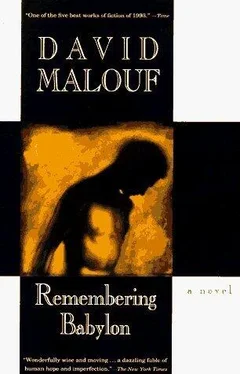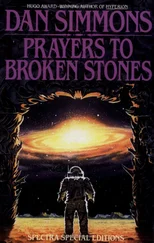After a time the man began to grunt, then to gabble as if in protest, but when Lachlan put the stick into his spine, moved on faster, producing sounds of such eager submissiveness that the boy’s heart swelled. He had a powerful sense of the springing of his torso from the roots of his belly. He had known nothing like this! He was bringing a prisoner in. Armed with nothing, too, but his own presumptuous daring and the power of make-believe.
So the little procession made its way to where the girls’ father was ringbarking in the gully below their hut.
An hour later news of the affair had spread all through the settlement. A crowd had gathered to see this specimen of — of what? What was he?
They stood in the heat, which was overpowering at this time of the day, and stared.
Distractions were unusual up here; even the Syrian pedlar did not trouble to come so far. They were isolated, at the end of the line.
Apart from their scattered holdings, the largest of which was forty acres, there was nothing to the settlement but a store and post office of unpainted weatherboard, with a verandah and a dog in front of it that was permanently asleep but if kicked would shift itself, walk five steps, then flop.
Opposite the store was a corrugated iron shack, a shanty-pub, unlicensed as yet, with hitching posts and a hollowed log that served as a trough.
The area between, the open space where they now stood, was part of a road perhaps, since horses and carts went back and forth upon it, and women in sunbonnets, and barefoot youths who, with nothing to do in the evening, came to sit with their feet up on the rails of the verandah and tell raw jokes, practise their spitting, and flick cigarette butts with a hiss into the trough. It was not yet a street, and had no name.
The nearest named place, Bowen, was twelve miles off, but the twelve miles meant that they were only lightly connected to it, and even more lightly to what it was connected to: the figure in an official uniform who had given it his name and the Crown he represented, which held them all, a whole continent, in its grip.
‘He’s an ugly-lookin’ bloke, aren’t you, eh? Faugh! Don’t ’e stink, but!’
‘Dumb. I reckon ‘e’s dumb.’
‘No he’s no’! He spoke t’ me. Don’t shoot, he said, didn’ ye, eh? Don’t shoot! Don’t shoot!’
The man, recognising the words as his own, showed his blackened teeth, which were ground down to the stumps, and did a little lopsided dance, then looked foolish.
‘Don’t shoot,’ the boy repeated, and held the stick up to his shoulder. One of the smaller children laughed.
‘Ah’m the wan he kens,’ the boy repeated. He was determined to keep hold of the bit of glory he had won. ‘Don’t you, eh? Eh? Ah’m the wan.’ With a boisterous persistence that kept him very nearly breathless, he scampered off to collar newcomers, but always dashed back to be at the man’s side, at the centre of their gaze.
For a moment back there, seeing himself as these grownups might see him, a mere kid, a twelve-year-old and small for his age, he had felt a wave of anxiety at how shaky his power might be. But he’d recovered — all his recoveries were like this, as quick as the fits of despondency he fell into — and was fired once more with the excitement of the thing. The air crackled around him. He shone. Over and over, in words that each time he repeated them made him see the event, and himself too, in a light more vivid, more startling, he told how it had happened: how the fellow had come flying at the fence ‘as if an airmy o’ fiends were aifter him’, and when he leapt up onto the rail, his words.
The words were what mattered most to the boy. By changing the stick he held into what his gesture had claimed for it, they had changed him too, and he did not want, now, to change back. So long as he kept talking, he thought, and the others listened, he would not.
Janet McIvor, who had also been there and seen all that occurred, though no one seemed interested in her version, was surprised that he was allowed to get away with it; their father wasn’t always so easy. But he and their mother seemed as gawpingly awe-struck as the rest. Neither of them had made the least move to bring him down.
The fact was that the event itself, which was so unusual and unexpected, had made the boy, since he claimed so large a part in it, as strange almost to their customary view of him as the half-caste or runaway. Something impressive and mysterious set the two figures, Lachlan Beattie as much as the straw-topped half-naked savage, in a dimension where they appeared unreachable. So the boy simply had his way till his aunt, who had never seen him in such a state, darting this way and that like an actor on a stage, out of a fear that he might be about to explode under her very eyes, told him for heaven’s sake to cool down, and his uncle, woken as if from a dream, stepped in and took a hand to him.
He looked about him, open-eyed at last, rubbed the side of his head where his uncle’s hand had come down, and was again just a wiry twelve-year-old. The runaway, who might, they now thought, be some sort of simpleton, was alarmed at this outburst and began to moan.
‘Me and Meg found him, just as much as Lachlan,’ Janet McIvor put in, seizing her opportunity, but no one paid heed. ‘And anyway, it was Flash.’
‘Oh for heaven’s sake, lassie,’ her mother told her, ‘dinnae you start.’
Meanwhile the man stood waiting. For what?
For one of them to start something.
But where could you start with an odd, unsettled fellow who, beyond what the boy Lachlan had heard him shout, had not a word you could make sense of in the English tongue; a pathetic, muddy-eyed, misshapen fellow, all fidgets, who seemed amazed by them — as if they were the curiosities here — and kept laughing and blinking.
He was a man who had suffered a good deal of damage. There were scorch marks on his chest and arms where he had rolled into a camp fire, and signs that he had, at one time or another, taken a fair bit of knocking about. One of his eyebrows was missing. Strange how unimportant eyebrows can be, so long as there are two of them. It gave his face a smudged appearance. He had the baffled, half-expectant look of a mongrel that has been often whipped but still turns to the world, out of some fund of foolish expectancy, as a source of scraps as well as torments.
His joints were swollen and one leg was shorter than the other and a little twisted. When he got excited he jerked about as if he was being worked by strings, one or two of which had snapped. He screwed his face up, grinned, looked interested, then, in a lapse of courage or concentration, went mute and glanced about as if he did not know, suddenly, how he had got there or where he was.
The country he had broken out of was all unknown to them. Even in full sunlight it was impenetrable dark.
To the north, beginning with the last fenced paddock, lay swamp country, bird-haunted marshes; then, where the great spine of the Dividing Range rose in ridges and shoals of mist, rainforest broken by sluggish streams.
The land to the south was also unknown. Settlement up here proceeded in frog-leaps from one little coastal place to the next. Between lay tracts of country that no white man had ever entered. It was disturbing, that: to have unknown country behind you as well as in front. When the hissing of the lamp died out the hut sank into silence. A child’s murmuring out of sleep might keep it human for a moment, or a rustling of straw; but what you were left with when the last sleeper settled was the illimitable night, where it lay close over the land. You lay listening to the crash of animals through its underbrush, the crack, like a snapped bone, of a ringbarked tree out in a paddock, then its muffled fall; or some other, unidentifiable sound, louder, further off, that was an event in the land’s history, no part of yours. The sense then of being submerged, of being hidden away in the depths of the country, but also lost, was very strong.
Читать дальше












